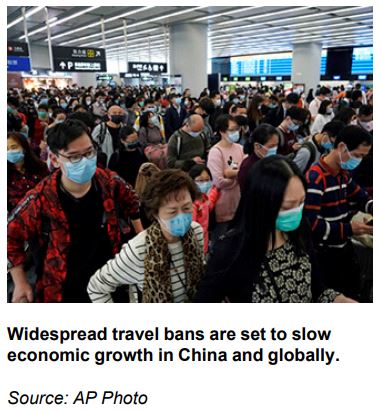S&P Global Offerings
Featured Topics
Featured Products
Events
S&P Global Offerings
Featured Topics
Featured Products
Events
S&P Global Offerings
Featured Topics
Featured Products
Events
S&P Global Offerings
Featured Topics
Featured Products
Events
Language
Featured Products
Ratings & Benchmarks
By Topic
Market Insights
About S&P Global
Corporate Responsibility
Diversity, Equity, & Inclusion
Featured Products
Ratings & Benchmarks
By Topic
Market Insights
About S&P Global
Corporate Responsibility
Diversity, Equity, & Inclusion
S&P Global Market Intelligence — 3 Feb, 2020
As the new coronavirus centered in the Chinese city of Wuhan overtakes the 2003 SARS epidemic in the number of global cases, the steps being taken to contain it are affecting industries across the world, with companies from Apple Inc. to Fiat Chrysler Automobiles NV and McDonald's Corp. taking a hit.
Much of the analysis into the potential economic cost to the world economy has been based on the Sars outbreak in 2003, which affected 8,096 people and killed 704, according to World Health Organization data. The new coronavirus has 9,900 reported cases, but just 215 fatalities thus far.
 While the 2003 outbreak had a limited international economic impact, today the Chinese economy is more than 8x larger, having grown from $1.66 trillion to $14.1 trillion since then. Rapid economic globalization has seen the tentacles of Chinese industry spreading deep into global supply chains, meaning impacts far beyond the borders of the country.
While the 2003 outbreak had a limited international economic impact, today the Chinese economy is more than 8x larger, having grown from $1.66 trillion to $14.1 trillion since then. Rapid economic globalization has seen the tentacles of Chinese industry spreading deep into global supply chains, meaning impacts far beyond the borders of the country.
Morgan Stanley calculates that the drag on global growth from the coronavirus could be as much as 0.3% in the first quarter of 2020, while an elongation of the crisis — now classified as a global health emergency by WHO — could cost global GDP a further 0.2% to 0.4% in the second quarter.
The interconnectivity of the globalized economy makes international manufacturers particularly vulnerable. Chinese factories are at the heart of the supply chain of Apple, the world's largest company by market capitalization, which is having to find alternative sources to mitigate any production loss.

China's Hubei province, the location of Wuhan, accounted for 27.4% of shipments from China to the U.S. in 2019, according to data from Panjiva, a supply chain-focused unit of S&P Global Market Intelligence. The region is associated with Hon Hai Precision Industry Co. Ltd., better known as Foxconn, a major supplier to Apple.
Apple widened the range of its earnings outlook in the first quarter of 2020 to between $63 billion and $67 billion to account for the uncertainty of production and Chinese sales in the wake of the virus.
Carmakers including Toyota Motor Corp., AUDI AG and Fiat Chrysler Automobiles NV have imposed travel bans on workers although they have more limited supply chains in the Hubei region.
The world's second-largest company by market cap, Alphabet Inc., has also been affected. The company has temporarily shut all of its mainland Chinese offices, as well as its sites in neighboring Hong Kong and Taiwan, and restricted business travel.
Consumer facing businesses on Chinese high streets are particularly under pressure as efforts to limit the spread of the disease most obviously disrupt consumers, with shops, restaurants and leisure activities suffering reduced sales.

The luxury brand sector will be assessing the potential damage to a market that accounts for 33% of global demand.
More than 40% of all luxury purchases are done by consumers when they travel overseas, so a large-scale disruption to the movement of people can have a direct impact on sales.
LVMH Moët Hennessy - Louis Vuitton Société Européenne, Burberry Group PLC and The Swatch Group AG are among the more vulnerable bigger luxury players.
Things are no better at the other end of the value scale as McDonald's announced Jan. 29 that it had closed "several hundred" restaurants across China including all of its locations in Hubei. Around 9% of all 38,695 McDonald's restaurants are in China, with the country accounting for 4% to 5% of global sales.
Major films had their release dates canceled as TMT (technology, media and telecom) companies including Beijing Energy Investment Holding Co. Ltd. and Tencent Holdings Ltd. lost earnings over the 200 million yuan Lunar New Year film market.
Credit Suisse Group AG, UBS Group AG, Deutsche Bank AG and HSBC Holdings PLC are among international banks stepping up their response to the outbreak.
Swiss lenders UBS and Credit Suisse recommended their employees in Hong Kong to work from home for two weeks if they recently visited mainland China, while Germany's Deutsche Bank advised staff to work remotely for seven days after any visit to the country, Bloomberg News reported.
Additionally, UBS asked its staff in Singapore to work remotely if they had come back from mainland China within the past two weeks. Credit Suisse also advised employees with fever or flu-like symptoms to work remotely until a doctor certifies that they are well enough to return, according to an internal memo obtained by Bloomberg.
OPEC members are considering bringing forward the March 5-6 meeting to discuss deepening cuts to production in light of the likely reduction in demand from China, the world's biggest importer of oil.
Brent oil shed 10% between Jan. 20 and Jan 30. While the benchmarks for gasoline (-10%), jet fuel (-13%), LNG, (-8%) and Henry Hub natural gas (-3.5%) all fell as a result of the outbreak, according to energy and commodities information provider S&P Global Platts.
Meanwhile, metals and mining companies are facing the prospect of their biggest customer scaling back demand. In what is another blow to the Australian economy following the devastating forest fire crisis, prices of iron ore — a mineral that accounts for 20% of Australian exports — slumped 13.5% between Jan. 20 and Jan. 30 as ports in Hubei closed and Chinese steel producers fell idle.
In that time, the major Australian miners BHP Group, Rio Tinto and Fortescue Metals Group Ltd., saw their share prices slump 7.4%, 7.6% and 11.0%, respectively, since Jan. 22.
Gautam Naik, Tayyeba Irum, Xiuxi Zhu, Miriam Jimenez, Phoebe Magdirila and S&P Global Platts contributed to this article.
This article was published by S&P Global Market Intelligence and not by S&P Global Ratings, which is a separately managed division of S&P Global.
